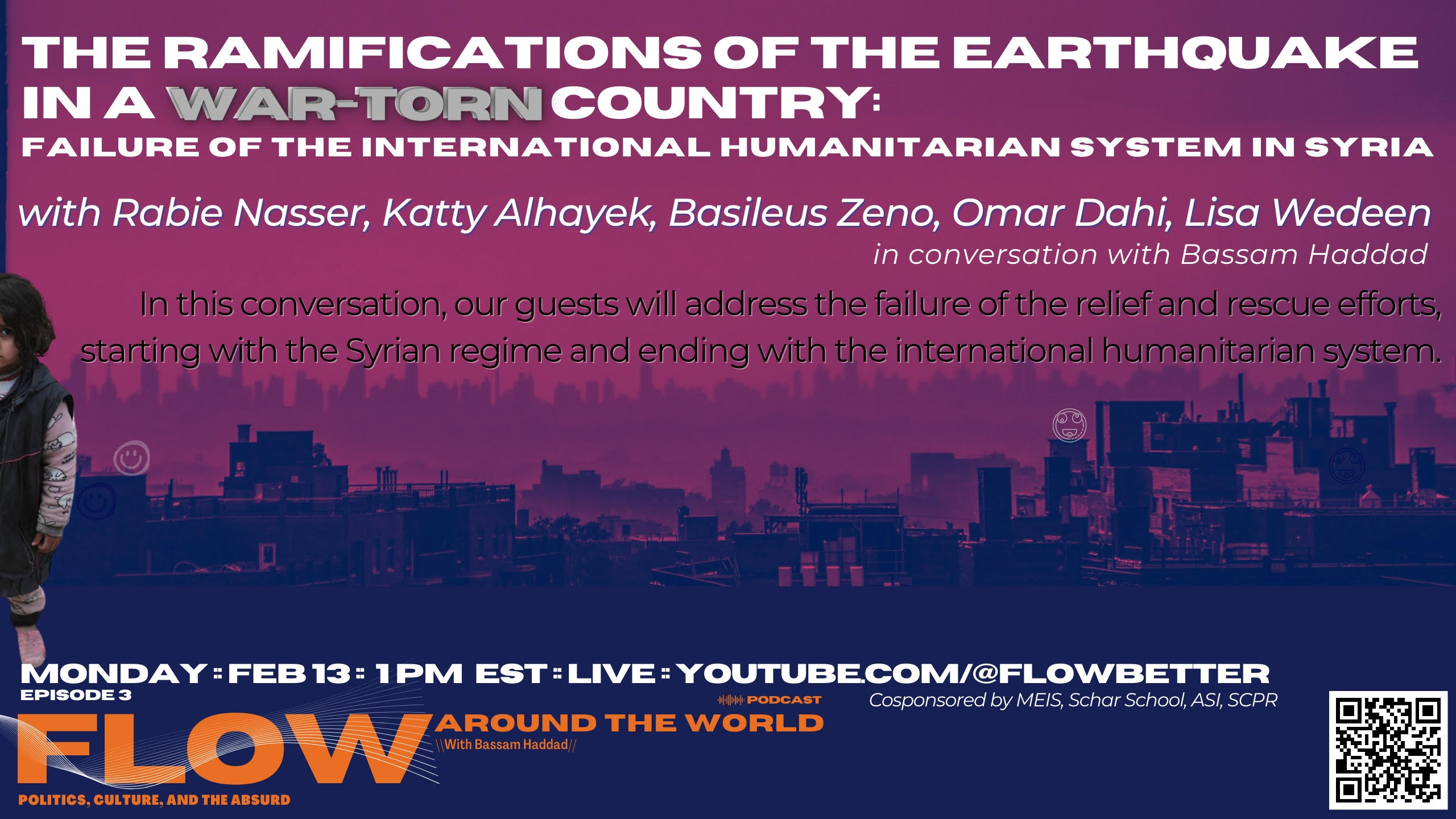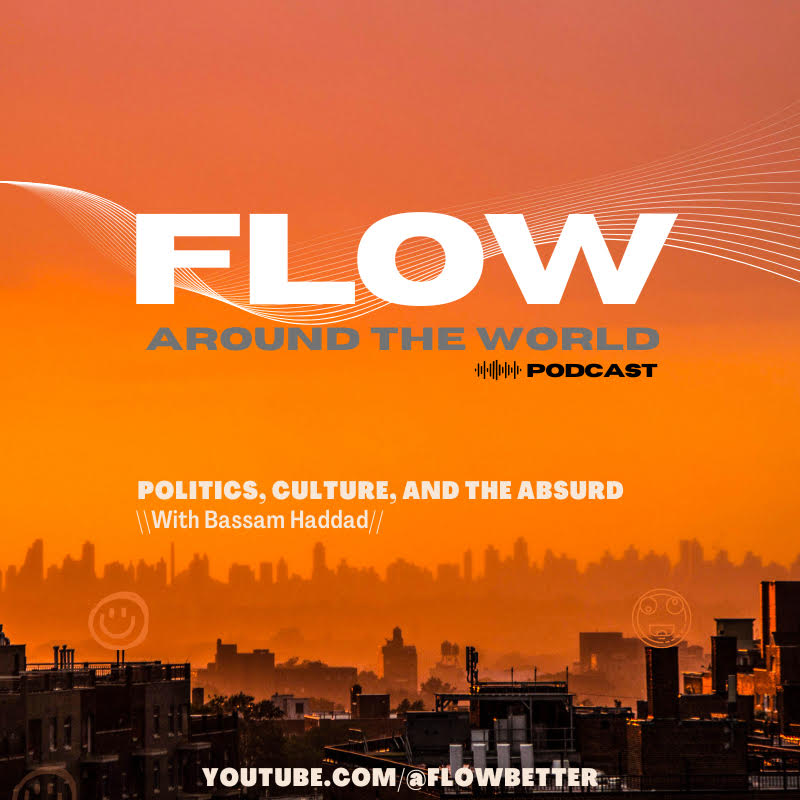Flow Podcast Episode 3
Youtube.com/@flowbetter/streams
The Ramifications of the Earthquake
in a War-Torn Country:
Failure of the International Humanitarian System
With Rabie Nasser, Katty Alhayek, Basileus Zeno, Omar Dahi, Lisa Wedeen
In conversation with Bassam Haddad
Monday, 13 February 2023
1:00 PM EST
Cosponsored by Middle East and islamic Studies, Schar School, Arab Studies Institute, Syrian Center for Policy Research
On this episode of the Flow Podcast, host Bassam Haddad will speak with guests Rabie Nasser, Katty Elhayek, Basileus Zeno, Omar Dahi, and Lisa Wedeen about the unfolding calamity in Syria. Speakers will address the failure of the relief and rescue efforts in the wake of the earthquake that shook the country on 6 February, starting with the Syrian regime and ending with the international humanitarian system.

Guests
Rabie Nasser is a co-founder of the Syrian Center for Policy Research (SCPR), working as researcher in macroeconomic policies, inclusive growth, poverty, and conflict dynamics. He obtained a B.A. in Economics from Damascus University in 1999. He has a MSc in Economics from Leicester University, UK. Before joining SCPR, Nasser worked for the State Planning Commission as Chief Economist and Director General of Macroeconomic Management Directorate. Afterwards, he worked as an Economic Researcher at the Arab Planning Institute in Kuwait. He then moved on to work as a senior researcher for the Syrian Development Research Center that conducts studies, evaluations, and applied research.
Basileus Zeno is a Sessional Assistant Professor in the Department of Politics at York University, and a co-editor of Jadaliyya’s Syria Page. He is also a MESA Global Academy Fellow (2021-2023). He received his Ph.D. in Political Science from the University of Massachusetts, Amherst in 2021. Following that, he was awarded Karl Loewenstein Fellowship in Political Science at Amherst College. Basileus also hold an M.A. in Political Science and International Relations from Ohio University (USA) and a B.A. and M.A. in Classical and Islamic Archaeology from Damascus University (Syria). Zeno’s writing has been published in academic as well as public-facing outlets, including Nations and Nationalism, Middle East Law and Governance, Digest of Middle East Studies, and The Washington Post. Additionally, Zeno received grants from major international institutions, including the Open Society Foundations, Carnegie Corporation of New York, and London School of Economics and Political Science. His work has combined research, advocacy, and policy work on political violence, refugees and forced migration, human rights, nationalism, cultural heritage, security, and interpretive, decolonizing methodologies. He has been invited by academic and public institutions as a writer and speaker on issues related to Syria, war, and displacement. He presented his work at academic institutions such as the University of Chicago, Harvard University, Duke University, UCLA, Wesleyan University, Hampshire College, Mount Holyoke College, Smith College, Wellesley College, and numerous other places.
Omar S. Dahi is a co-editor of Jadaliyya and an associate professor of economics at Hampshire College and co-director of the Peacebuilding and State building program and research associate at the Political Economy Research Institute, University of Massachusetts Amherst. His research interests are in the political economy of development in the Middle East, South-South relations, comparative regionalism, peace and conflict studies, and critical security studies. He has published in academic outlets such as the Journal of Development Economics, Applied Economics, Southern Economic Journal, Political Geography, Middle East Report, Forced Migration Review, and Critical Studies on Security. His last book South-South Trade and Finance in the 21st Century: Rise of the South or a Second Great Divergence (co-authored with Firat Demir) explores the ambiguous developmental impact of the new economic linkages among countries of the global South. He has served on the editorial collective of Middle East Report and is a co-founder and co-director of the Beirut School for Critical Security Studies working group at the Arab Council for the Social Sciences (ACSS). Dahi is also the founder and director of the Security in Context initiative.
Lisa Wedeen is the Mary R. Morton Professor of Political Science and the College and the Co-Director of the Chicago Center for Contemporary Theory at the University of Chicago. She is also Associate Faculty in Anthropology and the Co-Editor of the University of Chicago Book Series, “Studies in Practices of Meaning.” Her publications include three books: Ambiguities of Domination: Politics, Rhetoric, and Symbols in Contemporary Syria (1999; with a new preface, 2015); Peripheral Visions: Publics, Power and Performance in Yemen (2008); and Authoritarian Apprehensions: Ideology, Judgment, and Mourning in Syria (2019). Among her articles are the following: “Conceptualizing ‘Culture’: Possibilities for Political Science” (2002); “Concepts and Commitments in the Study of Democracy” (2004), “Ethnography as an Interpretive Enterprise” (2009), “Reflections on Ethnographic Work in Political Science” (2010), “Ideology and Humor in Dark Times: Notes from Syria” (2013), and “Scientific Knowledge, Liberalism, and Empire: American Political Science in the Modern Middle East” (2016). She is the recipient of the David Collier Mid-Career Achievement Award and an NSF fellowship, and is currently completing an edited volume with Joseph Masco, entitled Conspiracy/Theory.
Host
Bassam Haddad is Founding Director of the Middle East and Islamic Studies Program and Associate Professor at the Schar School of Policy and Government at George Mason University. He is the author of Business Networks in Syria: The Political Economy of Authoritarian Resilience (Stanford University Press, 2011) and co-editor of A Critical Political Economy of the Middle East (Stanford University Press, 2021). Bassam is Co-Founder/Editor of Jadaliyya Ezine and Executive Director of the Arab Studies Institute. He serves as Founding Editor of the Arab Studies Journal and the Knowledge Production Project. He is co-producer/director of the award-winning documentary film, About Baghdad, and director of the acclaimed series Arabs and Terrorism. Bassam serves on the Board of the Arab Council for the Social Sciences and is Executive Producer of Status Audio Magazine and Director of the Middle East Studies Pedagogy Initiative (MESPI). He received MESA's Jere L. Bacharach Service Award in 2017 for his service to the profession. Currently, Bassam is working on his second Syria book titled Understanding the Syrian Calamity: Regime, Opposition, Outsiders (forthcoming, Stanford University Press).

